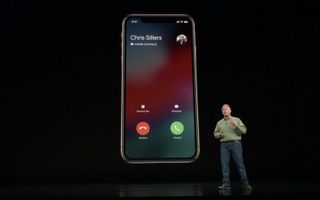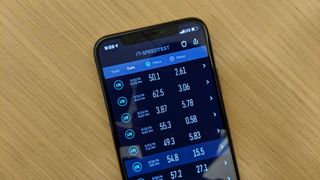Here's Why Apple Is Spending $1 Billion to Buy Intel's Modems
What Steve Jobs would have done

So many stories in the tech world are of the you-couldn't-predict-it variety, but not the news that Apple is spending $1 billion to buy Intel’s cellular modem business.
In the aftermath of Apple abandoning Intel for Qualcomm and Intel announcing its plan to get out of the modem business, this move felt almost inevitable since rumors of a deal first surfaced earlier this week.
Apple’s agreement to take on Intel’s intellectual property and 2,200 employees has its roots in the late '90s and Steve Jobs' return to Apple. It goes to the core of everything that makes Apple such a formidable force today.
Apple's near-death experience
In the late 1990s, Apple almost went out of business. When Jobs returned to the company, he made a series of bold decisions that got Apple back on its feet. On the Mac side, the company embraced a Windows-focused world and dropped Mac-only peripheral and networking standards while adding USB. The iMac (and an agreement from Microsoft to keep making Office for Mac) helped stabilize Apple's business and set the stage for the iPod, iPhone and iPad.
But Jobs learned a lot of lessons along the way to saving Apple. Microsoft's software support for the Mac may have helped the computer line survive, but in another way, Microsoft was holding the Mac back.
Most Mac-versus-Windows comparisons in those early days of the web focused on web browsing, and Internet Explorer —the default browser on both the Mac and Windows — was vastly superior on Windows. The Mac was seen as an inferior platform, in large part due to software that Apple couldn't control.
This struck a chord with Jobs. Apple's destiny was tied to something the company couldn't control: Microsoft's software. What happened next would be written into Apple's core culture over the next decade: Apple set up a software team to create a new Mac web browser of the company's own, one focused on speed and winning all comparisons with its Windows competition.
The result was Safari, now Apple's browser on both macOS and iOS devices. Apple was no longer reliant on Microsoft for a key part of its product's success.
Yes, invented here
Over the ensuing decades, Apple has repeatedly made strategic decisions that give it complete control over the key aspects of its products. A minor example: Frustrated by the limitations of USB, Apple designed the Lightning connector to solve the same problems that the USB consortium ultimately solved with USB-C. Who designs their own connector standard? Apple, that's who.
But then, there's the big one: silicon. For years, Apple has bounced from chipmaker to chipmaker to supply the company's devices — which is perfectly normal, of course, because companies that make computers are not chipmakers. Early on in Jobs' second tenure at Apple, he got burned by IBM, which made promises about the future of the PowerPC processor that Big Blue couldn't deliver. As a result, Apple moved the Mac to Intel processors.
This all led to perhaps Apple's biggest strategic move of this century, the company's purchase of chip designer P.A. Semi in 2008. Beginning with that acquisition, Apple has grown its chipmaking capabilities. Eleven years later, Apple makes some of the best mobile processors in the world, giving iOS devices an advantage over the smartphone competition. Apple-designed processors make the Apple Watch possible. They power the Apple TV, AirPods, and security and system control on modern Macs. On recent iPhones and iPads, Apple has taken over control of graphics processing as well.
Eleven years ago, it would've seemed like madness to assert that Apple could switch Macs over from Intel processors to ones designed by Apple itself, but here we are. These days, it seems like it's only a matter of time until Apple-designed chips are inside the Mac, and the iPad Pro already beats the speed of most of the laptops out there.
Which brings us to Intel's modem business.
Own the modem
Even before Apple's breakup with Intel over modems, all the rumors pointed to Apple gearing up to build its own modem chips. As the maker of iPhones and iPads, Apple knows that cellular modems are a vital part of its products — and the modem is one part that Apple currently doesn't control. Intel's delays in building a 5G modem and Apple's patent disputes with Qualcomm only underscored the lesson Jobs learned long ago in being disappointed by IBM and Microsoft: Don't rely on others for the most important stuff.

All of a sudden, Apple faced the possibility that it would be years behind its competition in 5G networking. That might be OK for a year or two, but in the long run, it was going to hurt Apple's core business. Of course Apple was going to start gearing up its own modem-design business. This is what Apple does when it's cornered.
The newly announced transaction with Intel is just the other shoe dropping. Intel's new CEO clearly decided that the company didn't want to be in this business, which meant a whole lot of modem engineers would be out of jobs and a lot of intellectual property would be sitting fallow. Meanwhile, Apple's setting up shop in San Diego near Qualcomm's headquarters, getting ready to build chips — and probably seeking some patent protection of its own to use in future licensing negotiations with Qualcomm.
Buying Intel's business lets Apple speed up its own efforts to control its own destiny in cellular technology. (I wouldn't be surprised to see that technology manifest not just in iPhones, iPads and Apple Watches, but also in Macs, AirPods and a whole new generation of wearable technology that's yet to be born.)
Jobs taught the lesson, and Tim Cook was listening well. If you need something done right, do it yourself.
Sign up to get the BEST of Tom’s Guide direct to your inbox.
Upgrade your life with a daily dose of the biggest tech news, lifestyle hacks and our curated analysis. Be the first to know about cutting-edge gadgets and the hottest deals.
Jason Snell was lead editor of Macworld for more than a decade and still contributes a weekly column there. He's currently running the Six Colors blog, which covers all of Apple's doings, and he's the creative force behind The Incomparable, a weekly pop culture podcast and network of related shows.
